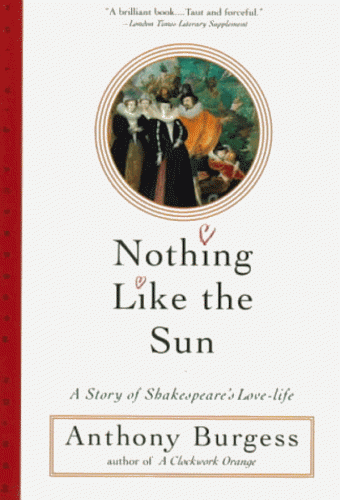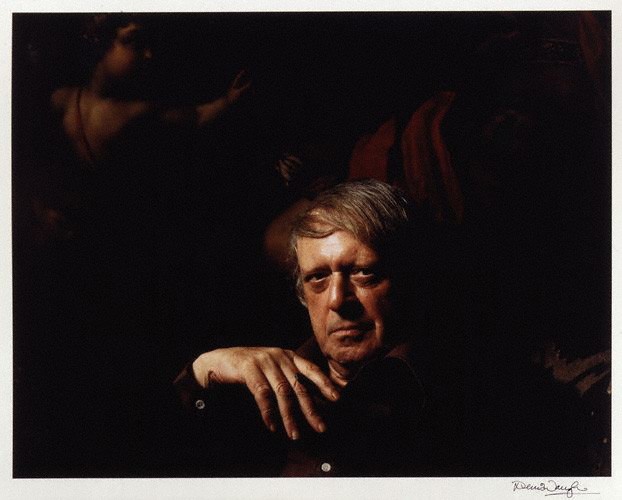Fuse News: Two Milestones – Shakespeare’s 450th and Anthony Burgess’ 50th
“Nothing Like the Sun” remains, for my money, among the best works of fiction inspired by Shakespeare’s life.
By Bill Marx
William Shakespeare’s 450th birthday is being celebrated with the appropriate amount of popular hoopla and scholarly homage, but so far (at least by way of Google search) I can’t find anyone huzzahing the 50th anniversary of the publication of Anthony Burgess’ novel Nothing Like the Sun. The volume remains, for my money, among the best works of fiction inspired by Shakespeare’s life. Burgess generates his antic portrait of a-randy “word-man” through a distinctive mix of Elizabethan argot and Joycean wordplay. At times, linguistic registers high and low commune peacefully, at other times they fight like cats and dogs. Thus the text demands a reader’s patience, at least initially. At one point, about to raise a glass to his lips, a young Shakespeare surveys the tipsy drinkers at a local Stratfordian watering hole:
Drink then. Down it among the titbrained molligolliards of country copulatives, of a beastly sort, all, their browned pickers a-clutch of their spilliwilly potkins, filthy from handling of spade and harrow, cheesy from udder new-milked, slash mouths agape at some merry tale from that rogue with rat-skins about his middle, coneyskin cap on’s sconce. Robustious rothers in rural rivo rhapsodic. Swill thou then among them, O-London-Will-to-be, gentleman-in-waiting, scrike thine ale’s laughter with Hodge and Tom and Dick and Black Jack the outlander from Long Compton.
An admirer of Ben Jonson’s (like me) will note that the earthy vitality of the passage’s language contains plenty of the poet/dramatist’s colloquial pizazz, and it is this inventive wordsmith-ery that makes Nothing Like the Sun so pleasurable. Once you enter into Burgess’ linguistic vision and become acclimated to its burgeoning hurly-burly you appreciate that this is one of the few historical novels that don’t report on another time but create an imaginative experience of being in another era. Unlike so many other re-creations of Shakespeare and his world, this one gives you a poet-to-be whose mind shimmers with flashes of lyric potential rather than serves as a bulletin board for academic platitudes or thematic point-scoring.
The book’s subtitle, “A story of Shakespeare’s Love-life,” suggests that the yarn may anticipate Tom Stoppard’s romantic/comedy Shakespeare in Love. But the polymorphously perverse machinations of Burgess’ Bard on-the-make — he seduces men and women, happily frequents whorehouses, and catches syphilis — is far from the air-brushed trysts purveyed in Hollywood fantasy. Burgess’ Shakespeare is driven by a yen to raise his status (“Shakespeare’s main aim, I think, was to make money, not to bequeath deathless plays to posterity”) and to gratify his libido. In this darkly comic novel, Shakespeare is seduced (while drunk) by Ann Hathaway into a loveless marriage and is haunted by extravagant visions of a muse/sex goddess (who appears in concrete form as the inspiration for the dark lady of the sonnets). Shakespeare scholar Jonathan Bate calls the novel “rollicking” in a recent piece in The Telegraph, which suggests he hasn’t read Nothing Like the Sun in a while.
Burgess is canny enough to set up a frame story claiming that the narrative is a lecture being given by a “Mr. Burgess” who is delivering his final talk on Shakespeare at a Malaysian college before going back to England. As he orates and sips rice wine, “Burgess” becomes progressively drunker. So who knows if we owe Shakespeare’s Comedy of Errors to the fact that Shakespeare left a volume of Plautus in a brothel — he was tossed out because he hadn’t had enough money to pay for services rendered — and had to come up with a homegrown substitute?
One more excerpt. Here is Shakespeare and his company partying at the completion of the Globe Theatre:
Before going in they downed a dedicatory cup of harsh ferrous wine, sun-warm. It was like drinking blood. Then they swigged another as the looked about them — the tiered galleries, the jutting apron, the canopy, the study not yet curtained, the tarrass. They mounted the stage, posturing, strutting, waving their spilling cups. They remembered old lines, ancient business, missed cues. … Chanting a growling war-song they marched from the left stage-door to the right, ran like mad down the steps, across the gloomy echoing cellarage unseen, up the steps that led to the left entrance, then resumed the stately tramping on-stage, an endless belt of an army, each man altering his shape and stance to make himself a new soldier at each entrance, but none ever letting go of his cup.
Few others (John Arden comes to mind) have expressed so well in prose the transformative energies of the Elizabethan/Jacobean stage. Theater was more than a business — it was a form of roustabout secular dissent, propelled by a fascination with the baptismal power of metamorphosis. So it is well worth raising a glass to the 50th anniversary of a book that so brilliantly (and bawdily) memorializes the Bard by stretching language hither and yon, from Avon riverrun …
Bill Marx is the Editor-in-Chief of The Arts Fuse. For over three decades, he has written about arts and culture for print, broadcast, and online. He has regularly reviewed theater for National Public Radio Station WBUR and The Boston Globe. He created and edited WBUR Online Arts, a cultural webzine that in 2004 won an Online Journalism Award for Specialty Journalism. In 2007 he created The Arts Fuse, an online magazine dedicated to covering arts and culture in Boston and throughout New England.



